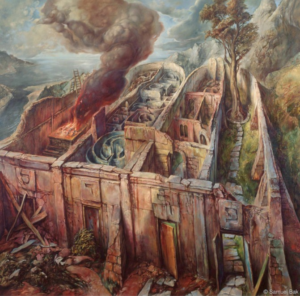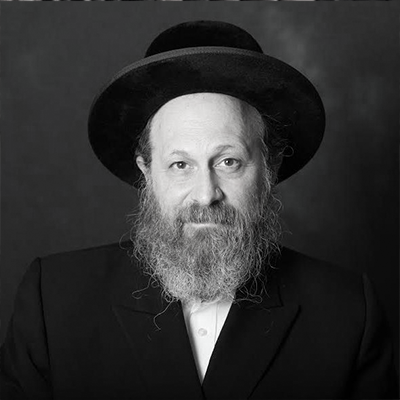
The Jews have long been a word-obsessed people. Samuel Ibn Tibbon, the great philosopher and translator, said some of the most tasteful words about the love for books that the Jews have carried through the diaspora:
Make your books your companions, let your cases and shelves be your pleasure grounds and gardens. Bask in their paradise, gather their fruit, pluck their roses, take their spices and myrrh. If your soul satiate and weary, change from garden to garden, from furrow to furrow, from prospect to prospect. Then will your desire renew itself and your soul be filled with delight.
Jews have a long-time love affair with the word. It has been said that Jews are more comfortable in the word than the world. Dr. Ora Wiskind looks at Hasidic texts from a literary perspective, and her work is a rich example of how deep reading and deep spirituality often can and should go hand in hand. But this has not always been so simple. This week’s Weekend Reader offers you a broader perspective on the perks, pleasures, and problems of reading.
Should Reading Do Something?
In Jewish thought, the four-fold interpretive process is referred to as the ‘Pardes’ in Hebrew. Though literally translated as garden, Pardes stands for Pshat, Remez, Drash, and Sod; Literalism, allegory, interpretation/hermeneutics, and the secretive/mystical. The imagery is interesting – why a garden? Perhaps it is because, like the verdant lushness of a garden, there is something inviting and open about this method, the Pardes providing an opportunity to experience the sense of immersion one might feel in a garden. The Pardes, and the multivalent meanings and uses of language have long been a characteristic quality of many streams of Jewish mysticism. Reading then becomes not just a tool for learning, but a spiritual endeavor in its own right.
Reflecting on the death of William Butler Yeats in 1939, W. H. Auden famously declared, “poetry makes nothing happen.” The timing is important: in 1939, the world was on the cusp of the great nightmare that no amount of poetry or literature could stave off. Humanism could not stop the atrocities of the 20th century, and in some ways, they even contributed to their own destruction. The historian Martin Malia writes that “it takes a great ideal to produce a great crime,” and some of the greatest perpetrators of cruelty were inspired by earlier works of art and poetry. And even if not directly responsible, the idea of engaging with poetry and literature in the face of such inhumanity seems unimaginable. “To write poetry after Auschwitz is barbaric.” So wrote Theodor Adorno in 1949, struggling with the inefficacy of poetic meaning after the atrocities of the Holocaust. Does poetry, or indeed literature, help a world in pain? To Adorno, time had taught an uncomfortable about the limitations of literature.
This broadly sketches the contours of one approach to texts – that poetry ‘does nothing,’ and perhaps more broadly, that ideas, books, and words represent a realm independent of real life. And maybe, precisely because it exists apart from reality, the world of words – of literature – offers an escape from the barbarities of this world. Even if literature cannot stop atrocities, it can help you escape them for a moment. Text and life are separate domains in this perspective, the ‘ivory tower’ of ideas removed from the rest of the kingdom of life.
Throughout our lives, we engage in creative dialogue in our search for meaning.
Another approach to reading texts does not ignore the synaptic gap between books and life, but seeks deep meaning from within that gap nonetheless. George Steiner, the Jewish literary critic who contributed greatly to the idea of the text as Jewish homeland, wrote powerfully about what a spiritually open stance towards reading might look like:
To read well is to take great risks. It is to make vulnerable our identity, our self-possession. In the early stages of epilepsy there occurs a characteristic dream (Dostoevsky tells of it). One is somehow lifted free of one’s own body; looking back, one sees oneself and feels a sudden, maddening fear another presence is entering into one’s own person, and there is no avenue of return. Feeling this fear, the mind gropes to a sharp awakening. So it should be when we take in hand a major work of literature or philosophy, of imagination or doctrine. It may come to possess us so completely that we go, for a spell, in fear of ourselves and in imperfect recognition. He who has read Kafka’s Metamorphosis and can look into his mirror unflinching may technically be able to read print, but is illiterate in the only sense that matters.
When he was twenty, Kafka wrote in a letter: ‘If the book we are reading does not wake us, as with a fist hammering on our skull, why then do we read it? So that it shall make us happy? Good God, we would also be happy if we had no books, and such books as make us happy we could, if need be, write ourselves. But what we must have are those books which come upon us like ill-fortune, and distress us deeply, like the death of one we love better than ourselves, like suicide. A book must be an ice-axe to break the sea frozen inside us.’ Students of English literature, of any literature, must ask those who teach them, as they must ask themselves, whether they know, and not in their minds alone, what Kafka meant.
Students of the Torah understand this type of reading, and students of mystical Torah perhaps more than most. Torah, like Kafka’s book, must be “an ice-axe to break the sea frozen inside us.” We can experience this quality, if we come to the book with openness.
The Book of the World: Reading the Text of our Lives
Citing his teacher, Rabbi Tzadok of Lublin wrote the following, reflecting on the relationship between the Torah and this world:
That God created a book, and that is the world, and the commentary (on the book), and that is that Torah. For the Torah is akin to a commentary of God’s possessions.
This powerfully provocative statement is rich – what does it mean for the Torah to be a commentary on this world? How might we conceive of our own world as a text, and the Torah as a commentary? Perhaps the task of meaning-making is an interpretive task. Like reading a book or learning a sefer, we are granted a text, but it is our reading, our interpretation or narrative of that text that makes all the difference. (For a deep exploration of the broader context and implications of this concept, see Dovid Bashevkin’s early article “The World as a Book.”)
Thinking of our lives as a book – as a work with an author, characters, themes, and a narrative – allows us to think about the way we think of our lives. In Ora’s own words, from her Hasidic Commentary on the Torah:
Paul Ricoeur taught that human experience is inherently interpretive. Throughout our lives, we engage in creative dialogue in our search for meaning. Hermeneutics, or the work of interpretation for Ricoeur, is not confined to text, nor to authors of texts: its primary concern is with the worlds which these authors and texts open up. It is by an understanding of the worlds, actual and possible, opened up by language, that we may arrive at a better understanding of ourselves.
This interpretive act brings the whole person to the text, and the whole text to the person. In her conversation with 18Forty, Ora reflects on one dynamic that this perspective bears insight on – whether her gender may bring something more to reading a text. In her words:
What do I bring to the study of Hasidism that might be different from the dominant trends of scholarship up till now? Or even, to put it in a more general sense, what can a woman bring to reading texts that might be different from what a man is bringing to learning them and to experiencing them?
I just like to open with a reference to one of the first or most important figures who discussed this whole issue of gendered reading, which is Carol Gilligan, her famous work in the 1980s, In a Different Voice. Some years later, a few decades later, she revisited this seminal publication of hers, it was an essay, “In a Different Voice,” and she defined what this different voice is.
So what she wrote is, “The different voice is identified not by gender, but by theme. Its difference arises from joining reason with emotion, self with relationships, undoing patriarchal splits and hierarchies. It articulates democratic norms and values, the importance of everyone having a voice, being listened to carefully and heard with respect.” So that’s end of quote. The different voice that I think that a woman can bring to Jewish studies in general, to the study of Hasidut, Jewish spirituality in particular, is identified not by gender, but by theme.
In other words, there are lots and lots of themes in Hasidic works that really demand attention. They have to do with topics that people don’t tend to think are important or worthy of concern, such as uncertainty, fear, failure, loss, the possibility of transformation, compassion, relationships, et cetera. So what I try to do in my own work is to be attentive to these other aspects of what the Hasidic teachings are actually trying to talk about – attentive to other themes, motifs, symbols – and to come to them from a different place. That is a perspective that some women have, and some men might have too, and some of each don’t have.
Ora Wiskind’s thought offers an engagement with the texts of the Jewish tradition that is both literary and life-affirming. Her work focuses on the ways we read Hasidic texts, and how appreciating the methods and meaning of a text can deepen our own lives. In her books on the stories of Rabbi Nachman of Breslov, the thought of Izhbitz-Radzyn, or in her masterful new work on Hasidic commentary, Ora demonstrates a scholarship that is illuminating and enriching to curious students and spiritual seekers alike. Listen now to Ora to learn more about her spiritual path, her approach in reading texts, and more.
For more on this topic, visit http://upgrapp.com/18forty/mysticism/





































